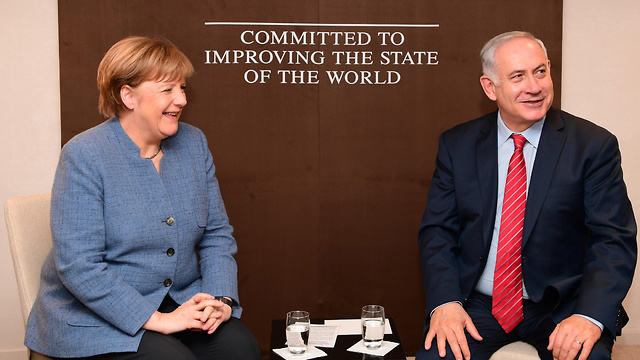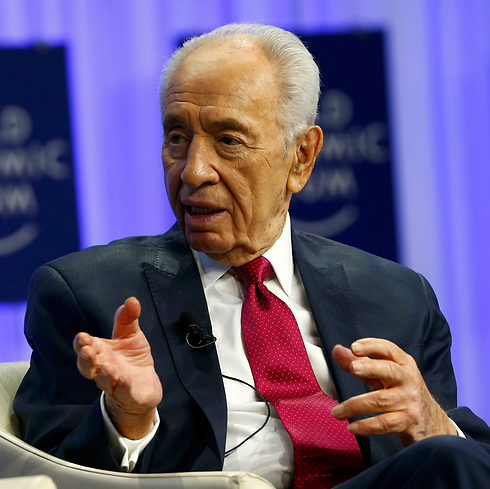

Netanyahu has become the new Peres
Op-ed: The prime minister, who slammed the late president for years for being out of touch with reality, seems to be suffering from the exact same disease; just like Peres spoke about ‘a new Middle East’ while the old Middle East was on fire, Netanyahu is talking about economic opportunities while the entire world is insisting on solving political problems.
This time, however, it isn’t former President Shimon Peres, who was a frequent guest of the international forum, but rather the person who replaced him as the Israeli sensation there: Prime Minister Benjamin Netanyahu.

A moment before leaving for Davos, Netanyahu boasted that he was going to meet with more than 10 world leaders. Granted, he has a lot to be proud of: Not everyone gets to meet the German chancellor, the French president and—of course—the American president. The problem is the message he is carrying with him there. Because ironically, and even absurdly, the man who slammed Peres for years for being out of touch with reality seems to be suffering now from the exact same disease.
The purpose of his participation in the forum is clear: “I will advance the standing of Israel which has already taken shape as a global technological power,” Netanyahu promised (alongside his plan to try, once again, to change the nuclear agreement). To take advantage of the Israeli startup nation’s technological reputation to tighten diplomatic ties, just like he did in his recent (successful) visits to India and China. He believes that marketing Israeli knowledge in the war on terror and innovation could yield diplomatic achievements and divert attention from the stalemate with the Palestinians, or even get the world to forget about it.
But by doing so, Netanyahu is demonstrating the same naiveté of which he often accuses his left-wing rivals. Because just like Peres spoke about “a new Middle East” while the old Middle East was on fire—and Netanyahu didn’t hesitate to tease him about it in the last elections—the prime minister is talking about economic opportunities while the entire world is insisting on solving political problems.
As the painful condemnation of US President Donald Trump’s Jerusalem announcement at the UN General Assembly proved, there is hardly any influential country willing to recognize the Israeli sovereignty in Judea and Samaria. And with all due respect to world powers like Honduras, Togo and Micronesia, which supported us, Narendra Modi’s hugs and handshakes with Vladimir Putin didn’t help: At the moment of truth, India, Russia and China voted against Israel.
And what about the United States? Well, don’t let the vice president’s fair hair and white smile blind you: Mike Pence is the old America. Surveys measuring the American public opinion on Israel in recent years have revealed two consistent findings, yet people here only like to talk about one of them.
The first finding is that more Americans support Israel than the Palestinians. That’s nice. The problem is with the second finding. A breakdown of that support reveals a troubling phenomenon: Under the age of 50, the support drops; under the age of 30, it plummets. This is something every Israeli should lose sleep over. Because even if Trump keeps tolerating Israel’s control of the Palestinians, his successors likely won’t.
Just like the “territories for peace” policy didn’t yield the result Israel wanted as part of the Oslo Agreements, Netanyahu's policy to advance “territories for business”—in other words, to try to legitimize the occupation in exchange for commerce with Israel—will lead to failure. As far as the international community is concerned, the economic channel isn’t an alternative to the diplomatic channel. And no matter how high he climbs up the Alps, Netanyahu won’t be able to escape this reality.
Dr. Yoav Fromer teaches politics and history at Tel Aviv University.

















